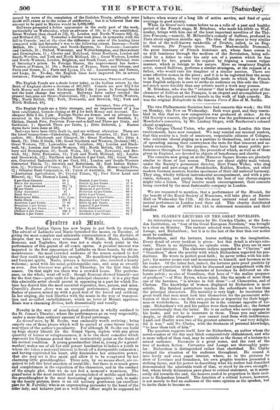Novelty in the way of non-lyrical production is wholly confined
to the St. James's Theatre • where the performances go on very respectably, under a more than ordinary amount of Royal patronage.
La Grand'tnere, by M. Scribe, was eminently worth reviving ; being exactly one of those pieces which will be quoted at some future time as real types of the author's peculiarity. For although M. Scribe can build up huge showy libretti for the Grand Opera, replete with any given quantity of horror or voluptuousness, it is to the short comedies which represent his Gymnase period that we instinctively point as the fruits of his normal condition. A young grandmother (that is, young for a grand- mother) makes use of all her still potent fascination to induce a youth in whom she takes a maternal interest to break off a disreputable connexion ; and having captivated his heart, ably diminishes her attractive power, that she may set it free again and allow it to be recaptured by her charming little granddaughter. Three acts, by no means short, are re- quired to tell this brief anecdote of social life ; but there is so much grace and completeness in the exposition of the characters, and in the conduct Of the sample plot, that we do not feel a moment's weariness. The grand'raere is the most amiable and accomplished of middle-aged ladies; the granddaughter is the most fascinating of ingenuites ; and, to make up the family pioture, there is an old military gentleman (an excellent parts for M. Ferville) who is an unpretending pretender to the hand of the alder lady, and behaves just as a well-bred officer might be supposed to
behave when weary of a long life of active service, and fond of quiet evenings in good society.
While La Grand'tnere comes before us as a relic of a past and healthy period of the French stage, M. Brindeau, who made his debfit on Wed- nesday, brings with him one of the least important novelties of the The- titre Francais,—namely, M. Melesville's comedy of Sullivan, produced in Paris about eighteen months ago. The idea of the piece is very similar to that of the well-known vaudeville of liridate, called, in an Eng- lish version, The Tragedy Queen. There Mademoiselle Dumeand, the great luminary of French histrionic art, whose fame comes to us still luminous through the medium of the Revolution, being soli- cited by a father to cure his only son of a passion which he has conceived for her, grants the request by feigning a coarse vulgar manner, which is foreign to her nature. Here an imaginary English actor, named Sullivan, performs a similar stratagem, at the request of a father, who would cure his daughter of a similar passion. There are some effective scenes in the piece ; end it is to be regretted that the scene is laid in London, for the very unEnglish mode in which the French treat English subjects is sure to strike an audience on this side the Chan- nel much more forcibly than any artistic merit a work may possess.
M. Brindeau, who was the " createur " that is the original actor of the character of Sullivan at the Francais, is an elegant and accomplished per- . former, who has gained several laurels in the walk of high comedy. He was the original Bolingbroke in the famous Vet-re d'Eau of M. Scribe.


































 Previous page
Previous page